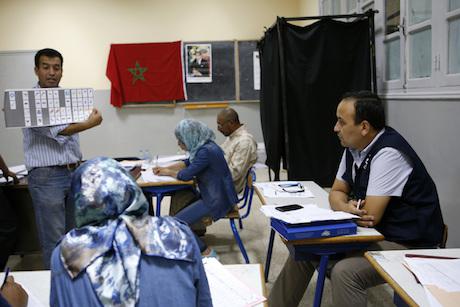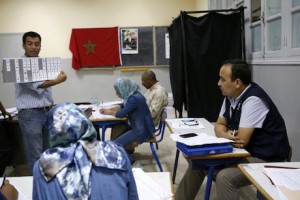SALMA REFASS
The one institution that benefited from the post-Arab Spring uncertainty and continues to profit from poor party politics, including the failed stint of the PJD in ‘power’, is undoubtedly the monarchy.
In the aftermath of the Morocco 2016 general elections, the general population, alongside observers, are wandering in post-electoral mayhem. With the freshly reelected conservative Islamist Justice and Development Party (PJD), Moroccans have shown their forgetfulness of the recent past and their lack of faith in any real change occurring in the near future.
Thus a look back at the previous election cycle and the five years of PJD government is de rigueur to understand what has happened to a country that only five years ago had wanted a different future for itself.
Back in 2011, when hope took over the minds of the disenfranchised, struggling and forgotten silent majority of authoritarian regimes in the Middle East and North Africa, Morocco kept its status as ‘an exception’ in the region. Although it meant no compliment in objective terms, the regime boasted of its ability to keep ‘troublemakers’ at bay while allowing for a new democratic form of governance to be slowly introduced and implemented.
As street demonstrations started erupting, later coined the ‘February 20’ movement, the regime was quick to respond. First, in early March 2011, the monarch announced a referendum for an expedited constitutional change – much like those seen by older generations in the country in 1970, 1972, 1992,1996 under former King Hassan II.
The second response consisted of elections that were to be fairand transparent to be held in November 2011 – the extent to which they really were is still subject to controversy and disagreements five years later. In 2011, the doings of the deep state – referred to as the Makhzen – proved that it was as strong as ever. Come November, for the first time in its history yet unsurprisingly, the urns elected the first Moroccan government to be led by the accepted Islamic party – the Justice and Development Party (PJD).
To political observers and foreign allies, Morocco and its Makhzen were ready to concede to the PJD win and thus finally abide by the rules of democracy risking to be governed by what, at the time, was considered an opposition party that had until then been kept outside the citadel of power.
However, the dream of a democratic Morocco with a true constitutional monarchy that those who had taken to the streets in early 2011 had wished for quickly shattered. In fact, the ease and rapidity with which the country went back to ‘business as usual’ were so great it seemed as if nothing had happened.
It seemed as though militants had not been imprisoned for taking to the streets; as though journalists weren’t muted for speaking out against an ever increasing security state; as though hopeful and daring civil society groups had never organized and managed to mobilize a part of the nation while keeping the other part mesmerized; as though police brutality had never scarred thousands of young and old citizens for life because they took to the streets or rebelled on the internet; as though the regime and its highest representatives had never had their names called out during street protests where people were asking for explanations and accountability. It was as though reality had never happened: Morocco did not have uprisings.
Once in control of the government, the PJD represented by PM Benkirane, was to be quickly confronted with the reality and meaning of governance in the Alawite Kingdom. Already weak due to the absence of a plan for the five years ahead, the PJD-led government faced a number of warnings by the Makhzen each time it came up with a reform plan or law proposal, so much so, that the first two years were nothing but a back and forth between the PM and the king, or his representatives.
The inherent weakness of a so-called Islamist political party in conjunction with the systemic and institutionalized meddling of the Makhzen has led the PJD to have a deplorable five-year record in almost every single policy area.
Five years have passed since then and Morocco is still the beacon of stability and democracy it has the illusion of being. New elections have taken place. This time around, it was not civil society that has mobilized for election day but rather the traditional apparatus of political parties, who have tried their best, yet failed, to oust the Islamist government led by PM Benkirane.
As the PJD appeals to a section of society, the general media (all except Le Desk being state or party affiliated) and the elite choosing to ignore their win is by no means a surprise. However, it is troubling that for a section of society it is as if this reality had never happened: the PJD has not failed to properly govern for the past fiver years.
When analyzing the last five years in light of the latest election cycle, two conclusions can be drawn.
The first is that nothing has changed and nothing will change with the reelected PJD government, in terms of balance of power, as the meaninglessness of elections is even greater than it already was in 2011.
If the PJD-led government served one purpose, it was to demonstrate to the public that no political party can steer policies nor do they hold any significant power. As such, the moment they take the reigns of government they become the façade of a pseudo-democracy.
The election results have shown that votes are still based solely on affect, as no one in their right mind could argue in defense of the PJD’s track record. The prized job in the country is looking like you are governing without actually having to do so.
The second conclusion is that the one institution that benefited from the post-Arab Spring uncertainty and continues to profit from poor party politics, including the failed stint of the PJD in ‘power’, is undoubtedly the monarchy. With a new PJD win, it will likely come out even stronger for the next elections, alongside its de facto party: the Authenticity and Modernity Party (PAM) – a sham of a party, introduced to the political arena just in time for the 2007 elections, founded by royal advisor and strongman of the Makhzen, Fouad Ali El Himma.
Well beyond the usual talk of monarchical resilience or the cult of legitimacy, so carefully built by the former king, surrounding the throne, King Mohamed VI has now gained the status of a unifying figure. The people’s devotion to him stems from a deep-seated fear of chaos. Across the political spectrum, all now see him as necessary – even if a ‘necessary evil’ as said by some in closed quarters – and is also praised by a wide majority.
These elections have proven it again, as the one party calling for diminished powers to the King through the implementation of a true constitutional monarchy – the Front de la Gauche Democratique (FGD) – has won a mere two seats. The king is thus entrusted with the country’s future and very far from anyone’s mind is the idea of ever having to hold the king accountable – a concept that is foreign to Moroccan politics and governance in general.
The monarchy’s success also lies in the fact that over the past five years it has helped with the implosion and discrediting of key traditional opposition parties, remnants of an old left – USFP, PPS, RNI. Over these past five years, the regime has carefully redesigned the PAM, allowing it to be the country’s only viable ‘opposition party’.
The result? It came in second after the PJD, with 102 seats, miles ahead of all other parties. If the strategy continues and external factors managed as usual by the Makhzen, a PAM-led government in 2022 is what should be expected.
The electoral period preceding the election has reminded us of the forgetfulness of a nation, as these elections display the same pattern as the 2007 elections while simultaneously conveying the impression that 2011 never happened.
Although political parties have refined their approach to campaigning, presenting clearer outlines of their political programs and improving their outreach strategies, the elections’ results have shown that votes are still based solely on affect. The lack of emphasis on actual governance strategies by all parties is proof alongside the endlessly recycled discourse of ‘insider vs. outsider party’ to appeal to voters.
The one aspect of the political game that has somewhat evolved is the professionalization of political parties’ campaign strategies and tactics that have succeeded in giving it the appearance of true electoral competition taking place in a fully democratic context.
The danger of such a facade is that it may once again convince – or rather trick – the non-political pundit voter who will likely believe that ‘this time, it’s different’ and thus abandon any rebellious tendencies he or she may have, hence unknowingly allowing for the status quo to be preserved.
About the author
Salma Refass is an economist/public policy analyst and assistant researcher in the Department of Government and International Relations, University of Sydney. Twitter: @salma_ref








